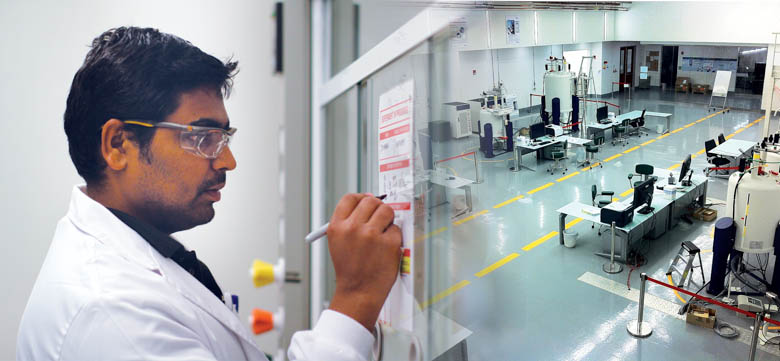“We are trying to become a hub for global energy research,” says Dr. Jean-Marie Basset, Director of the KAUST Catalysis Center (KCC). Dr. Basset is the developer of “surface organometallic chemistry,” a new field of chemistry that looks at catalytic reactions at the most fundamental levels. This new discipline has found a home within the KCC, which Dr. Basset describes as a “pluridisciplinary center” that investigates catalysis by design. “Our findings are not the result of trial and error; they are the result of a deep understanding of catalytic reactions at the molecular level.” These findings will lead to sustainable energy sources for the Kingdom and the world.
Under Dr. Basset’s leadership, the KCC has grown from three individuals in 2009 to more than 150 today, with a goal of a steady state of 200. The KCC currently partners with five companies that use its in-house expertise and research capabilities to turn groundbreaking research into industrial applications. “One of the reasons industry comes to us is we are very well equipped; we are probably the best-equipped catalysis center in the world,” says Dr. Basset.
KCC research is critical for solving energy and environmental problems in the Kingdom of Saudi Arabia, the Middle East, and beyond. While the Kingdom currently produces approximately 30 percent of the world’s oil, dependence on fossil fuels is not sustainable. “One day, there will be peak oil, and we must use our present resources to overcome the challenges of the world’s need for energy,” Dr. Basset says.
KCC researchers are helping industry to be able to produce energy from environmentally responsible sources. For example, the KCC is investigating with an industry partner how carbon dioxide and methane can be combined to produce hydrogen. “This is a clean energy vector that produces a lot of energy per unit volume,” Dr. Basset says.
Other lines of research are even more dramatic. The KCC and another industry partner are researching ways to “replace a full refinery with just one process and one catalyst,” says Dr. Basset. “If successful, this will be a big breakthrough. I like these challenges; they give you an opportunity in life to do something very exciting.”
This research offers more than an intellectual challenge. The KCC and its industry partners are hopeful that the work they do today will impact the world’s energy sources for generations to come. “If the catalysis community discovers the right catalysts for water splitting, the world’s petroleum need may decrease sharply,” Dr. Basset says.
Learn more about the KAUST Catalysis Center at kcc.kaust.edu.sa.
This post is archived and may contain outdated information.

